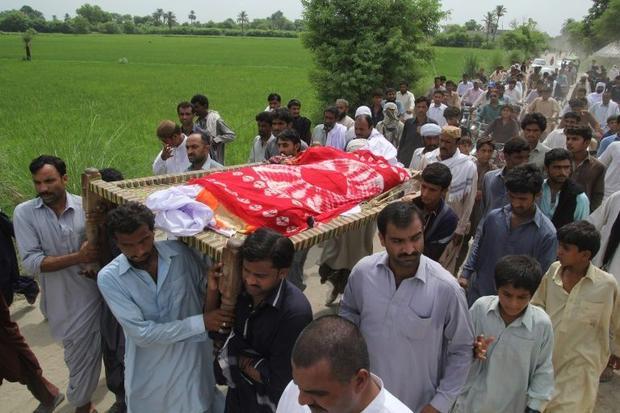The strangling of Pakistani social media starlet Qandeel Baloch by her brother has once again cast a spotlight on the custom of "honour killings", which claims around a thousand lives in Pakistan every year.
What are honour killings?
So-called honour killings are understood to mean the murder of a relative by another for bringing the family dishonour.
The pattern of crime has its roots in tribal social norms that remain prevalent across South Asia, and the victims are overwhelmingly women.
There were 933 honour killing cases in 2015, according to Pakistan's Federal Ministry of Law, but these may only represent a fraction of the true number.
Why do people so often get away with it?
The apparent rise in killings in recent years is largely linked to Pakistan's criminal code, which is a mixture of British-inherited law and Islamic custom based on Sharia introduced by military ruler Zia-ul-Haq.
In 1990, two years after Zia's death, government introduced the Qisas (blood money) and Diyat (retribution) law, allowing murderers to avoid jail by seeking forgiveness from a victim's relatives -- a convenient means of escape particularly in honour cases.
In his book, "The Application of Islamic Criminal Law in Pakistan: Sharia in Practice", legal scholar Tahir Wasti compared the decade 1981-1990, before the law, to 1991-2000.
He found that the number of murder victims increased by more than a third in districts around the city of Multan, near where Baloch was killed -- well above the population growth rate of around three percent in the area.
More startling still, the law "brought about a particularly visible change in the rate of cancellation of cases" -- from six percent to 12 percent -- as police encouraged parties to enter blood-money compromises.
Wasti said the laws had a "disconcerting" effect on the number of killings within families, "especially the honour killings of women".
Why is Qandeel's case significant?
Baloch, whose real name was Fauzia Azeem, was from the conservative working class, making her decision to openly embrace her sexuality in defiance of the prevailing patriarchy all the more bold.
She unapologetically tackled what she saw as religious hypocrisy, posing for selfies with a senior government cleric who she said had sought a meeting despite publicly criticising her.
"I thought I would expose him as he is in reality," she told AFP at the time.
In one of her last posts, she wrote: "As women we must stand up for ourselves... I LOVE THE WAY I AM."
Activists told AFP that in a country where violence against women is all too common, she had put a "face" to honour killings, and progressives fear her death will embolden would-be murderers.
What is being done about it?
Pakistan amended its criminal code in 2005 to prevent men who kill female relatives pardoning themselves as an "heir" of the victim.
But punishment is left to a judge's discretion when other relatives of the victim forgive the killer -- a loophole which critics say remains exploited.
In February, Prime Minister Sharif promised to amend the criminal code further, but no action has been taken since.
Opposition senator Sherry Rehman, a prominent women's rights activist, has been trying to amend the bill but requires the votes of Sharif's ruling party.
"I think they are pandering to the religious parties," she told AFP last month, referring to Pakistan's influential Islamist opposition.
In Baloch's case, at least, it seems unlikely the killers will go unpunished: her brother Muhammad Wasim had admitted to the crime, is in police custody, and his parents appear to want him to face justice.
The strangling of Pakistani social media starlet Qandeel Baloch by her brother has once again cast a spotlight on the custom of “honour killings”, which claims around a thousand lives in Pakistan every year.
What are honour killings?
So-called honour killings are understood to mean the murder of a relative by another for bringing the family dishonour.
The pattern of crime has its roots in tribal social norms that remain prevalent across South Asia, and the victims are overwhelmingly women.
There were 933 honour killing cases in 2015, according to Pakistan’s Federal Ministry of Law, but these may only represent a fraction of the true number.
Why do people so often get away with it?
The apparent rise in killings in recent years is largely linked to Pakistan’s criminal code, which is a mixture of British-inherited law and Islamic custom based on Sharia introduced by military ruler Zia-ul-Haq.
In 1990, two years after Zia’s death, government introduced the Qisas (blood money) and Diyat (retribution) law, allowing murderers to avoid jail by seeking forgiveness from a victim’s relatives — a convenient means of escape particularly in honour cases.
In his book, “The Application of Islamic Criminal Law in Pakistan: Sharia in Practice”, legal scholar Tahir Wasti compared the decade 1981-1990, before the law, to 1991-2000.
He found that the number of murder victims increased by more than a third in districts around the city of Multan, near where Baloch was killed — well above the population growth rate of around three percent in the area.
More startling still, the law “brought about a particularly visible change in the rate of cancellation of cases” — from six percent to 12 percent — as police encouraged parties to enter blood-money compromises.
Wasti said the laws had a “disconcerting” effect on the number of killings within families, “especially the honour killings of women”.
Why is Qandeel’s case significant?
Baloch, whose real name was Fauzia Azeem, was from the conservative working class, making her decision to openly embrace her sexuality in defiance of the prevailing patriarchy all the more bold.
She unapologetically tackled what she saw as religious hypocrisy, posing for selfies with a senior government cleric who she said had sought a meeting despite publicly criticising her.
“I thought I would expose him as he is in reality,” she told AFP at the time.
In one of her last posts, she wrote: “As women we must stand up for ourselves… I LOVE THE WAY I AM.”
Activists told AFP that in a country where violence against women is all too common, she had put a “face” to honour killings, and progressives fear her death will embolden would-be murderers.
What is being done about it?
Pakistan amended its criminal code in 2005 to prevent men who kill female relatives pardoning themselves as an “heir” of the victim.
But punishment is left to a judge’s discretion when other relatives of the victim forgive the killer — a loophole which critics say remains exploited.
In February, Prime Minister Sharif promised to amend the criminal code further, but no action has been taken since.
Opposition senator Sherry Rehman, a prominent women’s rights activist, has been trying to amend the bill but requires the votes of Sharif’s ruling party.
“I think they are pandering to the religious parties,” she told AFP last month, referring to Pakistan’s influential Islamist opposition.
In Baloch’s case, at least, it seems unlikely the killers will go unpunished: her brother Muhammad Wasim had admitted to the crime, is in police custody, and his parents appear to want him to face justice.
















